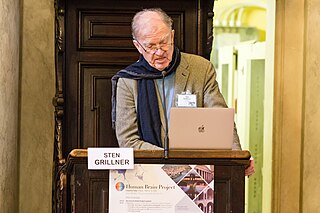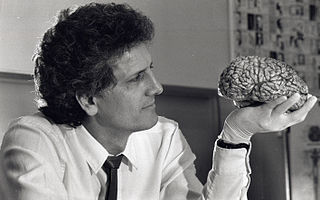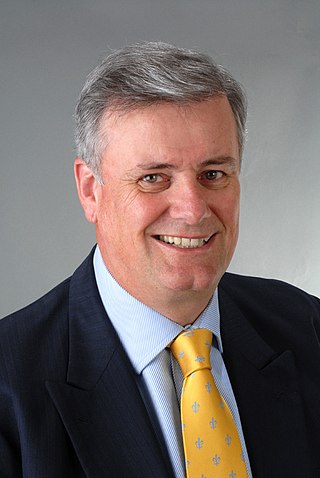Angela Vincent is Emeritus professor at the University of Oxford and a Fellow of Somerville College, Oxford.

Sir John Carew Eccles was an Australian neurophysiologist and philosopher who won the 1963 Nobel Prize in Physiology or Medicine for his work on the synapse. He shared the prize with Andrew Huxley and Alan Lloyd Hodgkin.
Clinical neurophysiology is a medical specialty that studies the central and peripheral nervous systems through the recording of bioelectrical activity, whether spontaneous or stimulated. It encompasses both research regarding the pathophysiology along with clinical methods used to diagnose diseases involving both central and peripheral nervous systems. Examinations in the clinical neurophysiology field are not limited to tests conducted in a laboratory. It is thought of as an extension of a neurologic consultation. Tests that are conducted are concerned with measuring the electrical functions of the brain, spinal cord, and nerves in the limbs and muscles. It can give the precise definition of site, the type and degree of the lesion, along with revealing the abnormalities that are in question. Due to these abilities, clinical neurophysiology is used to mainly help diagnose diseases rather than treat them.

Flinders University is a public research university based in Adelaide, South Australia, with a footprint extending across 11 locations in South Australia and the Northern Territory. Founded in 1966, it was named in honour of British navigator Matthew Flinders, who explored and surveyed the Australian and South Australian coastline in the early 19th century.

Rodolfo Llinás Riascos is a Colombian and American neuroscientist. He is currently the Thomas and Suzanne Murphy Professor of Neuroscience and Chairman Emeritus of the Department of Physiology & Neuroscience at the NYU School of Medicine. Llinás has published over 800 scientific articles.

Geoffrey Burnstock was a neurobiologist and President of the Autonomic Neuroscience Centre of the UCL Medical School. He is best known for coining the term purinergic signalling, which he discovered in the 1970s. He retired in October 2017 at the age of 88.

Sten Grillner is a Swedish neurophysiologist and distinguished professor at the Karolinska Institute's Nobel Institute for Neurophysiology in Stockholm where he is the director of that institute. He is considered one of the world’s foremost experts in the cellular bases of motor behaviour. His research is focused on understanding the cellular bases of motor behaviour; in particular, he has shown how neuronal circuits in the spine help control rhythmic movements, such as those needed for locomotion. He is current secretary general of International Brain Research Organization IBRO and President of the Federation of European Neuroscience Societies (FENS). For his work, in 2008 he was awarded the $1 million Kavli Prize for deciphering the basic mechanisms which govern the development and functioning of the networks of cells in the brain and spinal cord. This prize distinguish the recipient from the Nobel prizes in basic medical sciences.
A Bachelor of Medical Sciences (BMedSci, BMedSc, BSc(Med), BMSc) is an undergraduate academic degree involving study of a variety of disciplines related to human health leading to an in depth understanding of human biology and associated research skills such as study design, statistics and laboratory techniques. Such disciplines include biochemistry, cell biology, physiology, pharmacology or psychosocial aspects of health. It is an equivalent level qualification to the more commonly awarded Bachelor of Science (BSc). Graduates may enter a diverse range of roles including post-graduate study, higher education, the biotechnology industry, the pharmaceutical industry, consultancy roles, scientific communication, education or unrelated disciplines which make use of the broad range of transferable skills gained through this degree.

The Friends of Science In Medicine (FSM) is an Australian association which supports evidence-based medicine and strongly opposes the promotion and practice of unsubstantiated therapies that lack a scientifically plausible rationale. They accomplish this by publicly raising their concerns either through direct correspondence or through media outlets. FSM was established in December 2011 by Loretta Marron, John Dwyer, Alastair MacLennan, Rob Morrison and Marcello Costa, a group of Australian biomedical scientists and clinical academics.

Clinical Neurophysiology is a monthly peer reviewed medical journal published by Elsevier. It was established in 1949 as Electroencephalography and Clinical Neurophysiology and obtained its current title in 1999. The journal covers all aspects of neurophysiology, especially as relating to the pathophysiology underlying diseases of the central and peripheral nervous system. It is the official journal of the International Federation of Clinical Neurophysiology, the Brazilian Society of Clinical Neurophysiology, the Czech Society of Clinical Neurophysiology, the Italian Clinical Neurophysiology Society, and the International Society of Intraoperative Neurophysiology.

George Paxinos AO DSc FASSA FAA FRSN FAHMS is a Greek Australian neuroscientist, born in Ithaca, Greece. He completed his BA in psychology at the University of California at Berkeley and his PhD at McGill University in Montreal, Canada. After a postdoctoral year at Yale University, he moved to the School of Psychology of the University of New South Wales in Sydney, Australia. He is currently an NHMRC Senior Principal Research Fellow at Neuroscience Research Australia and Scientia Professor of Medical Sciences at the University of New South Wales.

Kenneth John Harvey AM is an Australian public health doctor, currently Honorary Adjunct Associate Professor at the Institute for Evidence-Based Healthcare in Bond University. Described by The Age as an "anti-quackery crusader", Harvey is an advocate of evidence-based medicine and a critic of pharmaceutical marketing and unproven diet products. He is the president of Friends of Science in Medicine. In 2017, Harvey was awarded a Member of the Order of Australia (AM) for his "significant service to community health and the pharmaceutical industry”.

Professor Colin J. Stirling is a biological scientist and academic. He lives in Adelaide, South Australia where he has held the position of Vice Chancellor of Flinders University since 2015.

Alastair Harvey MacLennan,, MB ChB, MD, FRCOG, FRANZCOG is a Scottish-Australian physician, professor of obstetrics and gynaecology, medical researcher, and a community health advocate. He studied and practised medicine in Glasgow, Chicago, and Oxford before moving to Australia in 1977 to take up a position at the University of Adelaide, where he went on to become the Professor and Head of the Discipline of Obstetrics and Gynaecology in 2006. He retired from his full-time academic position in 2013, and he is now Emeritus Professor of Medicine. He leads research projects at the Robinson Research Institute, and he is Head of the university's Cerebral Palsy Research Group.

John Michael Dwyer, is an Australian doctor, professor of medicine, and public health advocate. He was originally a Professor of Medicine and Paediatrics, then Head of the Department of Clinical Immunology at Yale University. Returning to Australia, he became Head of the Department of Medicine and the Clinical Dean at the University of New South Wales and Director of Medicine at Sydney's Prince of Wales Hospital, the University's major teaching hospital, for over twenty years. In retirement he is an Emeritus Professor of Medicine of the University. He founded the Australian Health Care Reform Alliance, and was the founding president of the Friends of Science in Medicine until 2019. He was appointed an Officer of the Order of Australia for his service to public health.
Robert Gwydir Booth Morrison, CF is an Australian zoologist and science communicator. He co-hosted The Curiosity Show which aired on television from 1972 to 1990. He has written or co-written 48 books about science for the general public.

Stephen George Waxman is an American neurologist and neuroscientist. He served as Chairman of the Department of Neurology at Yale School of Medicine, and Neurologist-in-Chief at Yale-New Haven Hospital from 1986 until 2009. As of 2018, he is the Bridget Flaherty Professor of Neurology, Neurobiology, and Pharmacology at Yale University. He founded the Yale University Neuroscience & Regeneration Research Center in 1988 and is its Director. He previously held faculty positions at Harvard Medical School, MIT, and Stanford Medical School. He is also visiting professor at University College London. He is the editor-in-chief of The Neuroscientist and Neuroscience Letters.
David James Burke is an Australian neurologist and clinical neurophysiologist. He has held senior positions at the Prince of Wales Hospital, University of New South Wales and University of Sydney. He led one of two teams that formed the Prince of Wales Medical Research Institute, which was renamed Neuroscience Research Australia in 2010. His career has included a focus on the role of spinal cord circuits in the control of movement, the excitability of peripheral nerve axons in health and disease, and other areas of clinical neurophysiology.
Paul Edward Rolan is an Australian physician, medical researcher, academic, and public health advocate. He specializes in the management of chronic pain and headache, and development of novel treatments.
John Philip Chalmers is an Australian medical researcher, best known for his work in the field of cardiovascular physiology, specifically for his research into hypertension.













